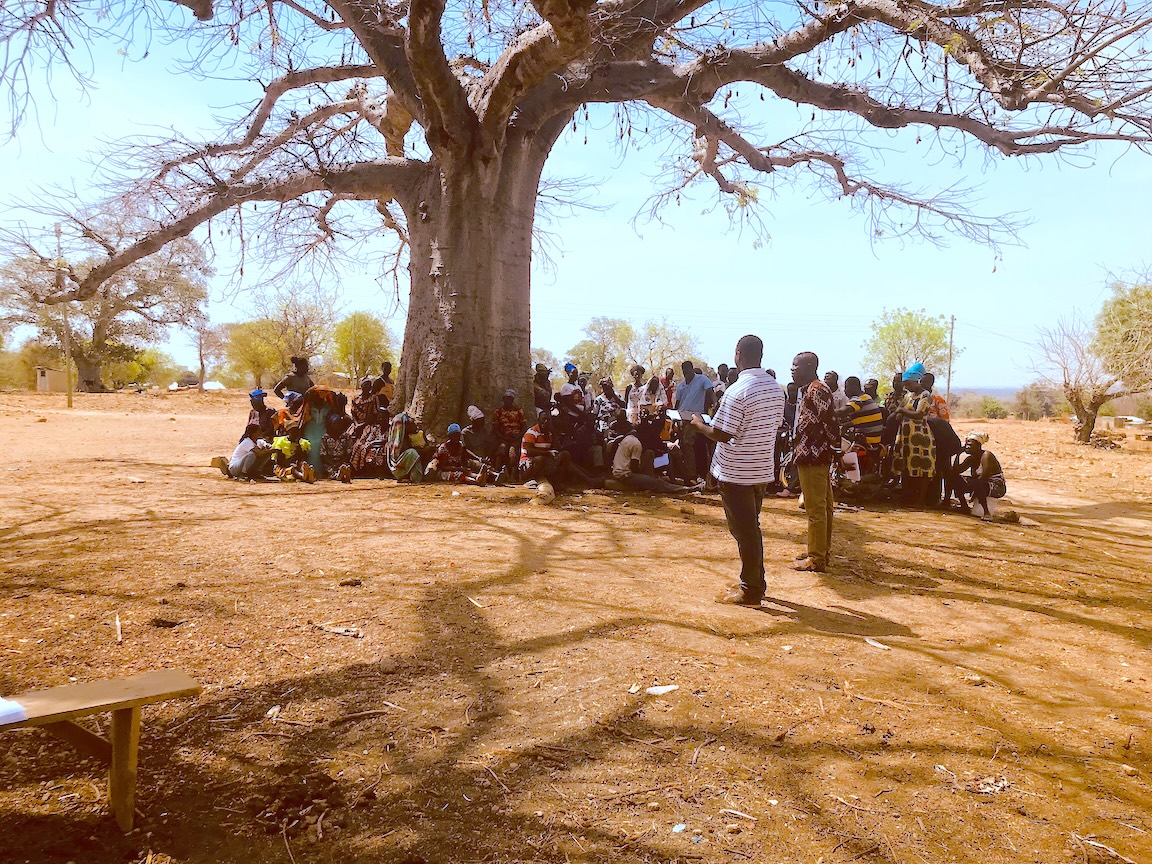Nuru Ghana launched in the Upper East Region of Ghana in early 2024. During its first year of work, Nuru Ghana worked with over 1,000 farmers through 10 farmer groups, delivering ignitia weather forecasting services while managing 5 demonstration plots.
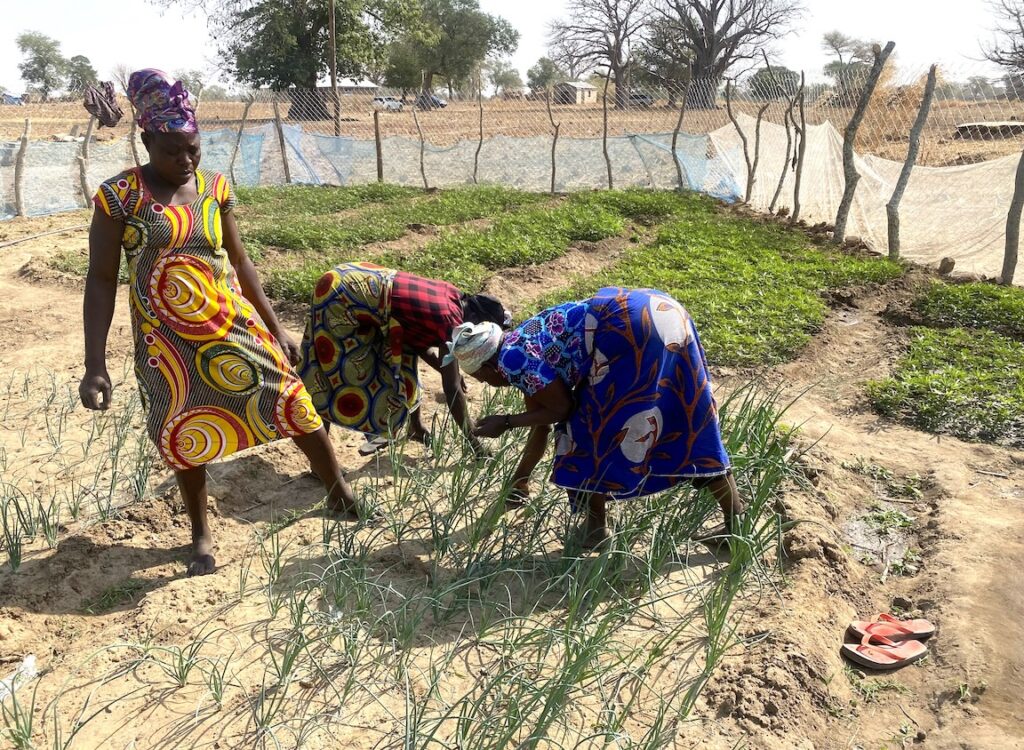
Weeding gardens in Ghana, 2024
In addition to these activities, much of Nuru Ghana’s efforts focused on 1) understanding the full scope of the challenges facing rural communities in the Upper East Region and 2) beginning to build community trust alongside critical public and private partnerships to support future activities.
2024: Assessing Local Context in Ghana
When Nuru begins activities in a new region, as part of its initial information gathering to more fully understand the local context, it completes a baseline report. To complete this report, Nuru Ghana surveyed a sample of local farmers to gather information about:
- Current yield trends: How much are farmers able to grow and harvest?
- Yield Potential: With improved inputs and agricultural practices, what is the realistic potential for increased yields?
- Agricultural practices with minimal intervention from Nuru Ghana: What is the current local approach to farming? Do those practices support long-term sustainability?
- Value provided from ignitia weather services: Nuru Ghana provided farmers with access to the ignitia weather service. Was this helpful to farmers?
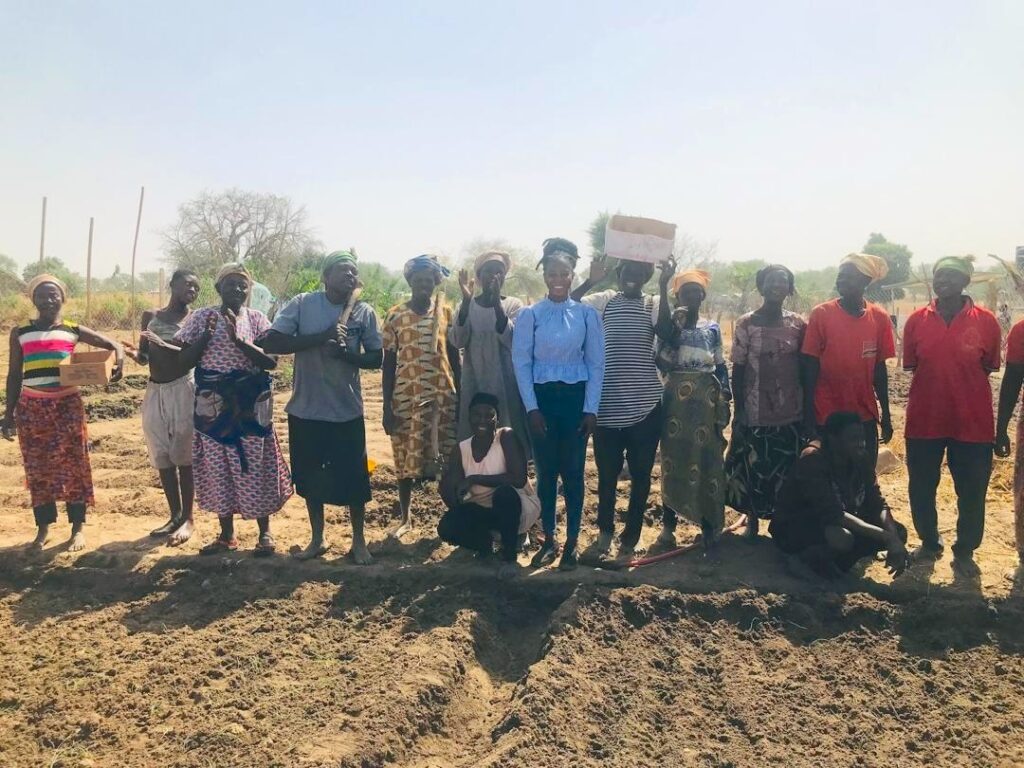
Baseline Survey: What are the current community challenges?
The baseline report demonstrates the need for Nuru Ghana’s support in equipping farmers to increase their yields through climate-smart practices, professionalize their agribusinesses, and continue receiving access to critical weather information. Currently, low yields, lack of access to markets and new agriculture technologies, and the resulting low levels of income combine to create substantial difficulties for these rural communities.
What are demonstration plots?
To support baseline evaluation, Nuru Ghana also managed 5 soybean demonstration plots. These are small sections of land used to showcase farming techniques, crops, or agriculture technologies in real conditions, giving local farmers the opportunity to see the impact of specific farming practices or the growth of new or improved crops. Crop research and selection was one of Nuru Ghana’s most critical activities. Nuru Ghana collaborated with local agricultural experts to identify the ideal package of inputs (certified seeds, inoculants, and organic fertilizer) to produce healthier soil and increased yields. Among its considerations, Nuru Ghana took into account the market potential of soy, how desired the crop was among local farmers, and both the availability and cost of seeds. During 2024, these demonstration plots offered farmers a comparison point against their own crops, as much of the techniques Nuru Ghana applied to the demonstration plots were different from those of local farmers.
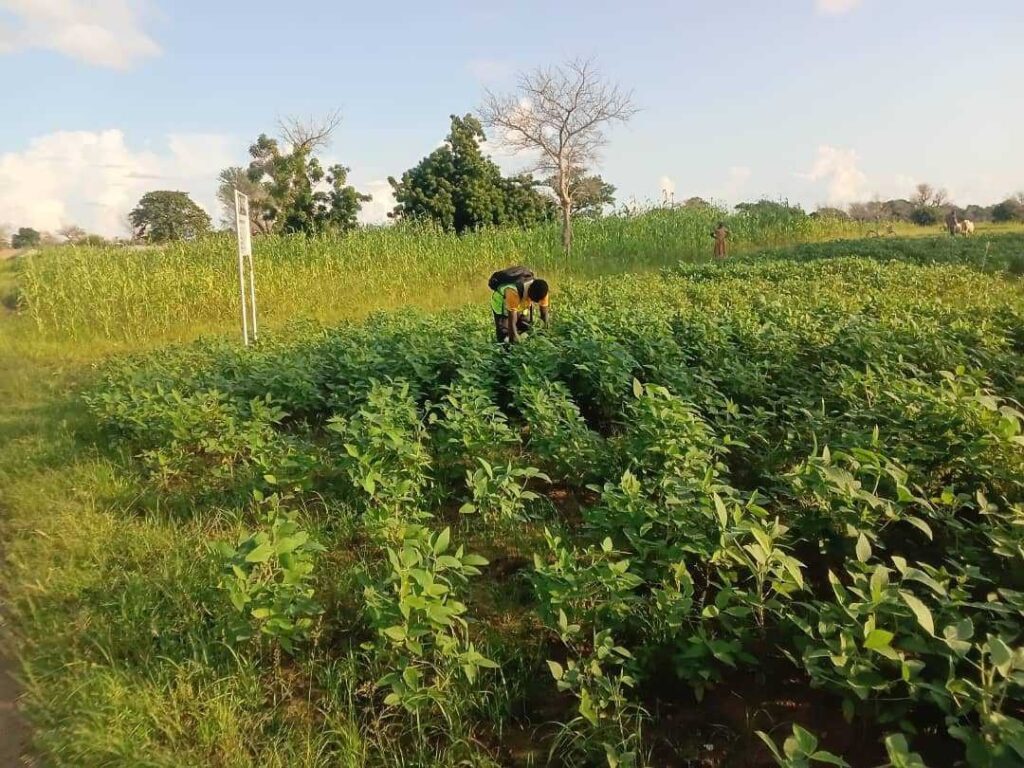
Nuru Ghana demonstration plot
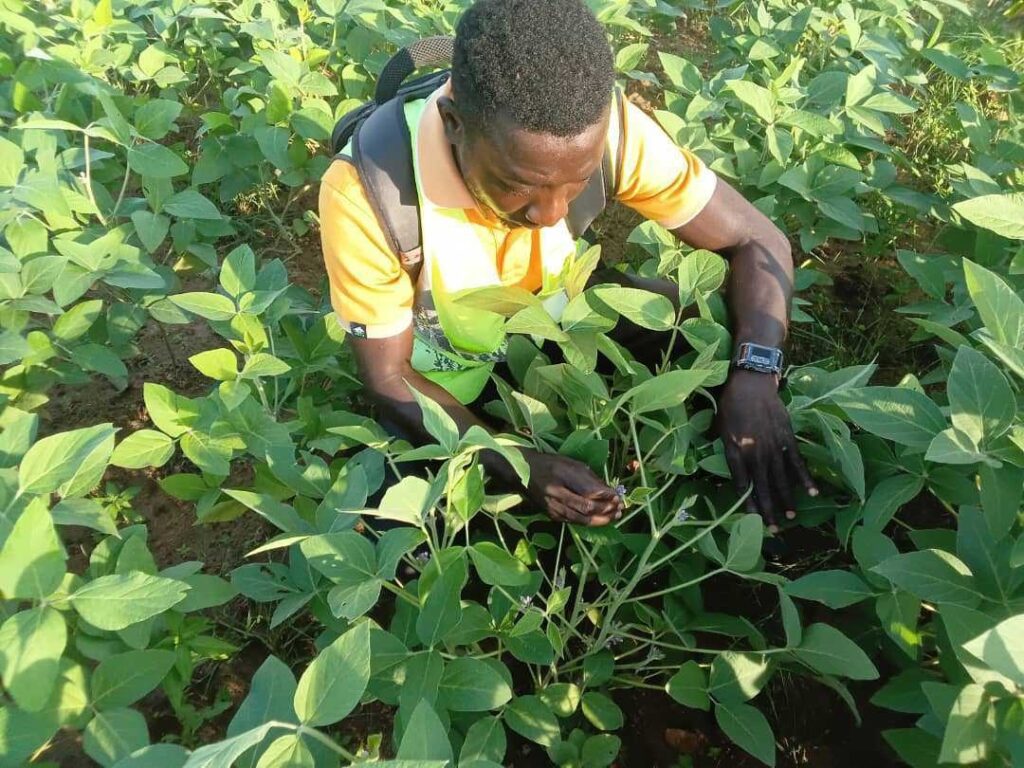
The yield data collected from these demonstration plots also provides Nuru Ghana with an estimate of what local farmers can expect to yield in future years as they shift to climate-smart practices and use improved seeds. Nuru Ghana successfully yielded nearly 3 times the amount that local farmers are harvesting on the same amount of land (827.5 kg versus 278 kg per hectare). As Nuru Ghana supports farmers to access the same quality inputs as those used on the demonstration plots and begin utilizing the same climate-smart agricultural (CSA) practices, it expects farmers to increase both their yields and the agricultural incomes.
“Demonstration plots are a great communal point for community learning and a good platform for building trust. These plots provided an avenue for farmers to meet and learn hands-on techniques and technologies while also sharing knowledge and ideas. This not only helped the farmers, especially during the onset of drought, but solidified Nuru Ghana’s partnership with the Ministry of Food and Agriculture, as these demonstration plots became training hubs for the majority of farmers in the communities.” -David Pwayidi, Nuru Ghana Project Coordinator
Nuru Ghana’s baseline report is published in partnership with the Ray Marshall Center at the University of Texas. View the full Nuru Ghana Baseline Report here.
What is SCOPEinsight?
In addition to the baseline report, Nuru Ghana completed a SCOPErapid assessment of the 10 farmer groups it worked with during 2024. Similarly to the baseline, this assessment provided Nuru Ghana staff with a foundational understanding of the existing strengths, weaknesses, and opportunities for growth among these farmer groups.
SCOPErapid assessments, provided by Nuru’s partner SCOPEinsight, evaluate the farmer groups on the following elements, assessing current business professionalism:
- internal management
- financial management
- operations
- production base
- market
In Upper East Ghana, farmers groups are common, however organized and registered cooperative agribusinesses are not. These farmer groups face a variety of challenges in the categories above, and Nuru Ghana will be able to tailor its support to these groups based on their assessments. In 2026, the groups will be evaluated again to assess their growing professionalism and the impact of Nuru Ghana’s interventions.
Facing Real-World Challenges: Ghana’s Drought
At Nuru, we work in marginalized communities that have faced the compounding impacts of extreme poverty, conflict, and climate change. While we look forward to the future with hope, we always anticipate obstacles in our activities and are prepared to adapt with the expertise of our local leaders.
Local farmers in Ghana have already been facing increasing threats from climate change, including droughts, flooding, and unpredictable rainfall combined with soaring heat indices (World Bank). During 2024, Ghana faced yet another drought, and as this was Nuru Ghana’s first year of operations, it immediately put the local team to the test.
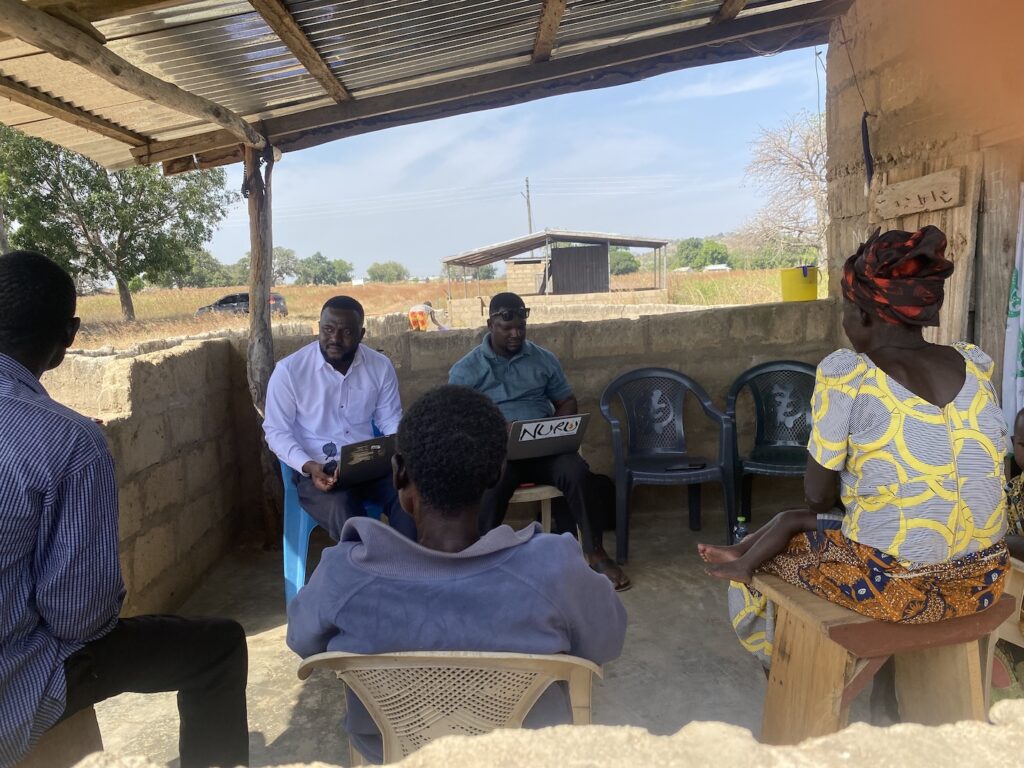
Nuru Ghana staff meeting with community members in the Upper East Region of Ghana, 2024
What happened with the 2024 drought in Ghana?
In 2024, Ghana saw one of its worst droughts in decades, with half of the regions in the country impacted, including where Nuru Ghana works in the Upper East Region. Late onset rains combined with an extended dry season when crops are undergoing an important flowering period. Without proper rainfall during the flowering period, crops fail. Over one million people were impacted by the drought in “communities [that were] struggling to access food due to price increases, weak financial capacities, low seasonal production and earlier than normal depletion of households’ food stocks” (World Food Programme). As crops failed around the country, the Ghanaian government banned exports of wheat, rice, and corn, in an attempt to support food security within its borders (USDA).
“Ignitia text messages saved me last year from throwing [away] my seeds and fertilizers, as it correctly predicted when it will rain and when it will not rain.” -Atuguba, Nuru Ghana farmer
What did the Nuru Ghana team learn?
- Ignitia was highly valuable, receiving a 100% satisfaction rate from farmer users, who not only relied on the weather service to make their own on-farm decisions, but also routinely shared these learning with other members of the community. Formerly, these same farmers were only able to access weather information from radio stations with lower accuracy rates. One farmer shared, “Ignitia was very useful to me and my neighbors, as the rains were not easy to predict, so we all depended on the messages to plan our farming and even social activities.” Learn more about the ignitia weather service in this blog post.
- Planting times are especially crucial when weather patterns suddenly change. While all five of Nuru Ghana’s demonstration plots were impacted to some degree by the drought, 2 of them had to be replanted due to poor germination caused by the lack of rainfall. This ultimately impacted their yields the most. Despite this, the demonstration plots on average still yielded 3x as much as those of local farmers.
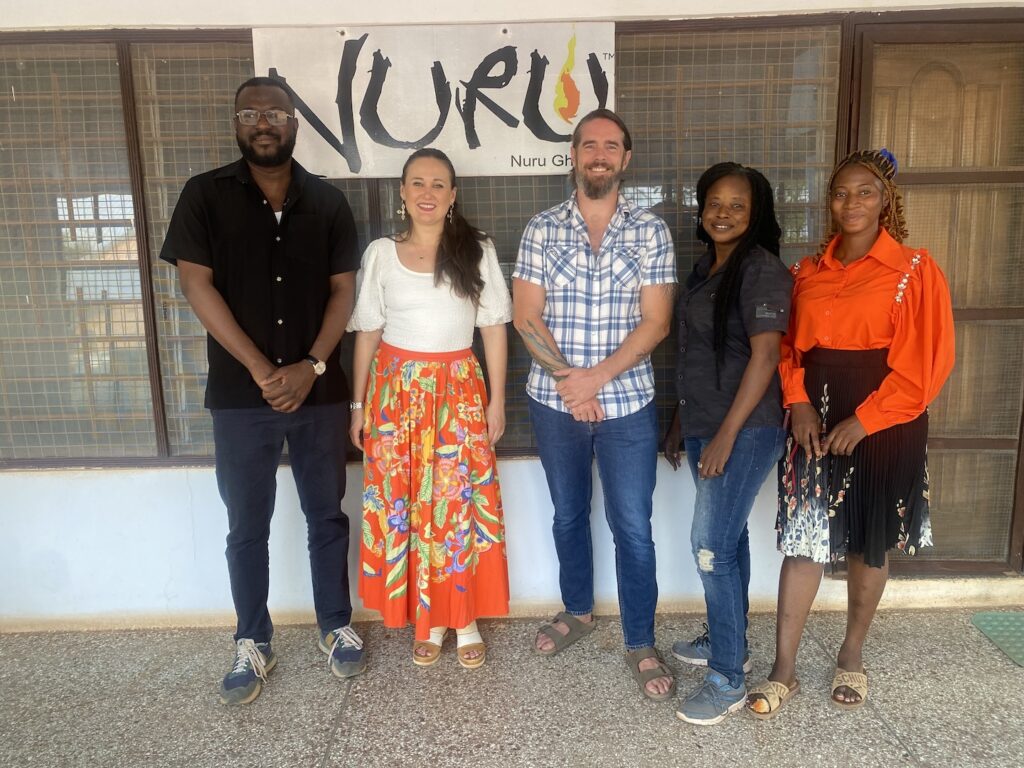
Nuru Ghana staff with Nuru Sr. Impact and Markets Associate Bethany Ibrahim and Nuru Chief Sustainability Officer Casey Harrison
- Partnerships are vital to Nuru Ghana’s success. In addition to partnering with ignitia, SCOPEinsight, and the Ray Marshall Center, Nuru Ghana began establishing local partnerships with the Ministry of Food and Agriculture, the lead government agency responsible for Agriculture in Ghana, as well as with local leadership at the Kassena Nankana West District. The Council for Scientific and Industrial Research(CSIR), CSIR-Savanna Agriculture Research Institute, which serves as the lead agriculture research institute in Ghana, provided technical guidance in selecting a drought-tolerant seed variety and providing sowing specifications and other technical guidance. Strong private sector partnerships are also vital, like those with OCP Africa and Embett Agro, a generous supplier who provided inputs for demonstration plots at no cost.
“I wish to use ignitia this year, as it was very helpful to me last year. If it was not for ignitia I would have lost all my farm and wasted fertilizers and seedings.” -Joshua, Nuru Ghana farmer
Nuru Ghana’s Next Steps in 2025
In 2025, Nuru Ghana will focus on supporting farmer groups based on the baseline report and the SCOPErapid assessments, beginning with formal registration as businesses. Formal registration supports access to resources and markets that are otherwise unavailable to these informal farmer groups. Nuru Ghana will also support the farmer groups to integrate digital finance tools into their operations and establish revolving funds (pools of money retained by the farmer groups and used to issue loans to members).
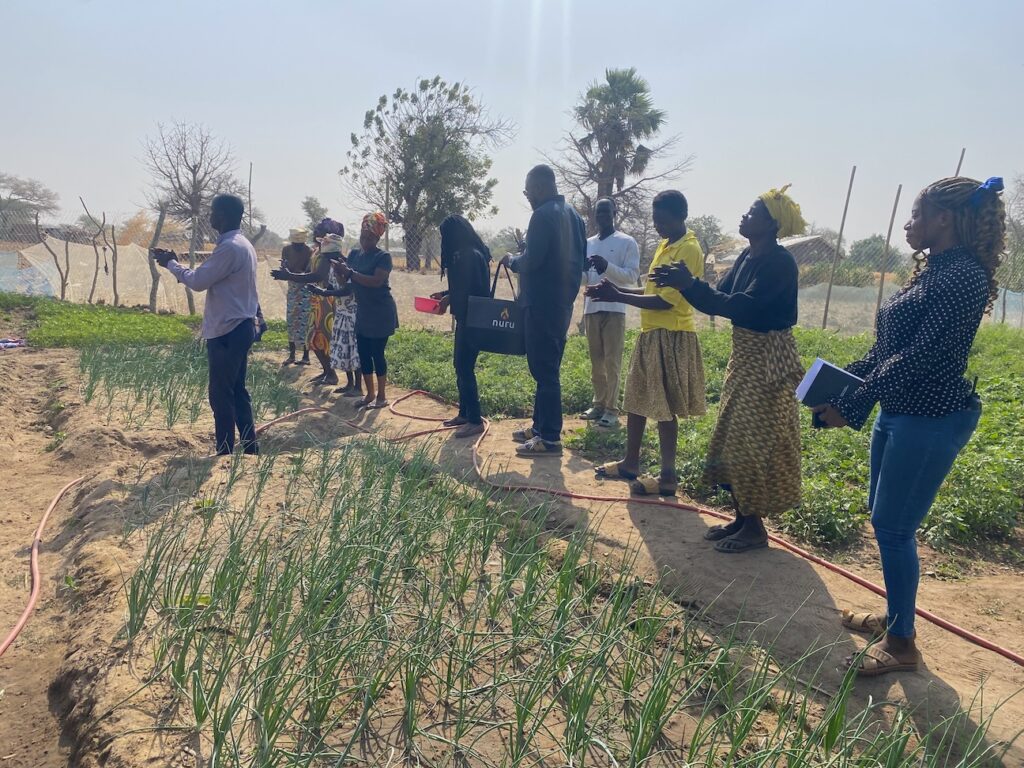
Cooperative members in Upper East Ghana in their dry season vegetable garden plot. Pictured, members are singing and celebrating the man who has donated his land for them to use for their garden.
Demonstration plots will continue to be an important tool for Nuru Ghana, as they will provide CSA training during the planting and growing season. These demonstration plots will be especially important as Nuru Ghana introduces additional drought-tolerant crops. For farmers facing extreme poverty, shifting to new crops can pose significant risk; however, demonstration plots decrease this risk for farmers by providing hands-on learning opportunities. This year, Nuru Ghana will add an additional demonstration plot in a new community and will target reaching an additional 1,000 farmers. Nuru Ghana’s 2026 impact evaluation will identify the extent to which the organization has been able to increase yields and incomes, increase CSA practices, and formalize farmer groups into professional agribusinesses.


